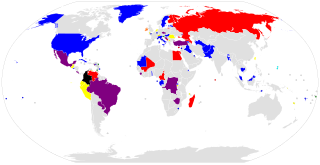 |
|---|
Legislative elections were held in New Caledonia in 1934 to elect half of the General Council. A first round was held on 14 October, with a second round on 28 October. [1]
 |
|---|
Legislative elections were held in New Caledonia in 1934 to elect half of the General Council. A first round was held on 14 October, with a second round on 28 October. [1]
The elected Members of the General Council were elected using the two-round system for six-year terms. Half of the Council was elected every three years. The Chamber of Agriculture and Governor nominated additional members to the Council. [1]
The elected members were Beaumont, Berges, Collardo, James Louis Daly, Laborderie, Milliard, Paladini and Terrier. Governor Bernard Jacques Victorin Siadous appointed Louis Imboult and Souland, whilst Louis Page, Andre Robert and Michel Verges were nominated by the Chamber of Agriculture. [1]

The Legislative Council of the Hong Kong Special Administrative Region (LegCo) is the unicameral legislature of Hong Kong. It sits under China's "one country, two systems" constitutional arrangement, and is the power centre of Hong Kong's hybrid representative democracy, though popular representation in the legislature has diminished significantly in recent years, along with its political diversity.

The Legislative Council is the upper chamber of Tynwald, the legislature of the Isle of Man. The abbreviation "LegCo" is often used.

The Parliament of South Australia is the bicameral legislature of the Australian state of South Australia. It consists of the 47-seat House of Assembly and the 22-seat Legislative Council. General elections are held every 4 years, with all of the lower house and half of the upper house filled at each election. It follows a Westminster system of parliamentary government with the executive branch required to both sit in parliament and hold the confidence of the House of Assembly. The parliament is based at Parliament House on North Terrace in the state capital of Adelaide.

The Federation Council, or Senate, is the upper house of the Federal Assembly of Russia, according to the 1993 Constitution of the Russian Federation.

Elections in Rwanda take place within the framework of a multi-party democracy and a presidential system. The President and majority of members of the Chamber of Deputies are directly elected, whilst the Senate is indirectly elected and partly appointed.
The Senate was the upper house of the Parliament of South Africa between 1910 and its abolition from 1 January 1981, and between 1994 and 1997.

Tamil Nadu Legislative Council was the upper house of the former bicameral legislature of the Indian state of Tamil Nadu. It began its existence as Madras Legislative Council, the first provincial legislature for Madras Presidency. It was initially created as an advisory body in 1861, by the British colonial government. It was established by the Indian Councils Act 1861, enacted in the British parliament in the aftermath of the Indian Rebellion of 1857. Its role and strength were later expanded by the second Council Act of 1892. Limited election was introduced in 1909. The Council became a unicameral legislative body in 1921 and eventually the upper chamber of a bicameral legislature in 1937. After India became independent in 1947, it continued to be the upper chamber of the legislature of Madras State, one of the successor states to the Madras Presidency. It was renamed as the Tamil Nadu Legislative Council when the state was renamed as Tamil Nadu in 1969. The Council was abolished by the M. G. Ramachandran administration on 1 November 1986. In 2010 the DMK regime headed by M. Karunanidhi tried to revive the Council. The former AIADMK regime (2016-2021) expressed its intention not to revive the council and passed a resolution in the Tamil Nadu Legislative Assembly in this regard.
Bombay Legislative Council was the legislature of the Bombay Province and later the upper house of the bicameral legislature of Bombay Province in British India and the Indian state of Bombay.

The lieutenant governor of Indiana is a constitutional office in the US state of Indiana. Republican Suzanne Crouch, who assumed office January 9, 2017, is the incumbent. The office holder's constitutional roles are to serve as the president of the Indiana Senate, become acting governor during the incapacity of the governor, and become governor should the incumbent governor resign, die in office, or be impeached and removed from office. Lieutenant governors have succeeded ten governors following their deaths or resignations. The lieutenant governor holds statutory positions, serving as the head of the state agricultural and rural affairs bureaus, and as the chairman of several state committees.
Diarchy was established in Madras Presidency based on the recommendations of the Montague-Chelmsford report. Five elections were held during the period diarchy was in effect and Justice Party occupied power most of the time. It ended with the election in 1937 when the Government of India Act 1935 came into effect.

The Legislative Council was the legislature of Nyasaland.

This national electoral calendar for 2018 lists the national/federal elections held in 2018 in all sovereign states and their dependent territories. By-elections are excluded, though national referendums are included.

General elections were held in Western Samoa on 30 November 1926.

The 2019 Italian by-elections were the elections called to fill seats of the Parliament that were become vacant after the 2018 general elections.
Legislative elections were held in New Caledonia in January 1945. The first round of voting was held on 7 January and the second round on 24 January.

The North Carolina Council of State elections of 2020 were held on November 3, 2020, to select the ten officers of the North Carolina Council of State. These elections coincided with the presidential election, elections to the House of Representatives, elections to the Senate and elections to the North Carolina General Assembly and top state courts. Primary elections were held on March 3, 2020, for offices for which more than one candidate filed per party.
Legislative elections were held in New Caledonia on 6 October 1957. The result was a victory for the Caledonian Union, which won 18 of the 30 seats.

A general election was held in the U.S. state of Minnesota on November 3, 2020. All seats in the Minnesota Senate and Minnesota House of Representatives were up for election as well as several judicial seats, Minnesota's 10 presidential electors, a United States Senate seat, Minnesota's eight seats in the United States House of Representatives, and several positions for local offices. A primary election to nominate major party candidates and several judicial and local primary elections were held on August 11, 2020.

The 2020 United States state legislative elections were held on November 3, 2020, for 86 state legislative chambers in 44 states. Across the fifty states, approximately 65 percent of all upper house seats and 85 percent of all lower house seats were up for election. Nine legislative chambers in the five permanently-inhabited U.S. territories and the federal district of Washington, D.C. also held elections. The elections took place concurrently with several other federal, state, and local elections, including the presidential election, U.S. Senate elections, U.S. House elections, and gubernatorial elections.

The 2016 Vermont Senate election took place as part of the biennial United States elections. Vermont voters elected State Senators in all 30 seats. State senators serve two-year terms in the Vermont Senate. The election coincided with elections for other offices including the Presidency, U.S. Senate, U.S. House, Governor, and State House. A primary election held on August 9, 2016 determined which candidates appeared on the November 6 general election ballot.